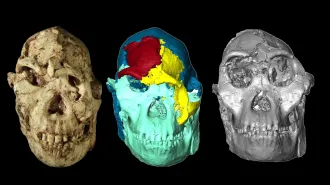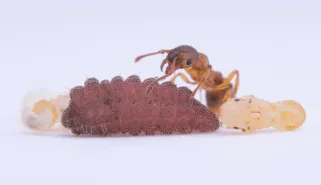Cancer-fighting roles
Scientists have discovered a new
role in cancer protection for an already well-known tumor suppressor
protein. The protein, called p53, protects cells from becoming
cancerous by sensing stress and either shutting down cell division or
triggering cell death. Researchers at the University of Tokyo and
colleagues have discovered that p53 also plays a role in slicing
stretches of RNA into regulatory molecules called microRNAs (SN: 8/15/09, p. 8). Mutations of the gene for p53 prevent proper assembly of microRNA-processing machinery, the researchers found.
MicroRNAs are tiny, containing only about 22 nucleotides, or chemical letters. But the molecules have a big influence on nearly every aspect of cellular function. The absence of some microRNAs has recently been linked to cancers. Researchers at Johns Hopkins University, along with others, replaced a microRNA missing from liver cancer cells in mice and either stopped growth of or shrunk tumors (SN: 7/4/09, p. 13). And scientists at MIT discovered that lacking just one copy of Dicer1, a gene that encodes a protein that helps snip RNAs into microRNA, can make for more aggressive cancer in mice (SN Online: 12/2/09).
Pack it up
A map of the 3-D structure of the human genome (above) shows fractal folding is key to tidy packing (SN: 11/7/09, p. 14).
Unexpected epigenetics
One study finds a similarity
between identical twins in DNA’s chemical tagging; another finds
tissue-specific methylation signatures in the genome (SN: 2/14/09, p. 5).
Tummy aches and autism
Researchers show a genetic link
between digestive disorders and autism in some families. Children with
two copies of a particular version of the MET gene are more likely to have both conditions (SN: 3/28/09, p. 11).
Sweet link
A liver protein may link high fructose corn
syrup and diabetes: Reducing levels of PGC-1 beta in mice fed a high
fructose diet protected the animals from insulin resistance and fatty
liver disease (SN Online: 3/3/09).
Genome roundup
Scientists unveil the first draft of the
Neandertal genome, which suggests that Neandertals and humans did not
interbreed much (SN: 3/14/09, p. 5). Teams also release the genomes of maize (SN Online: 11/19/09), cattle (SN Online: 4/23/09) and cassava; the pig, cucumber and horse (SN: 12/5/09, p. 5); the panda (SN: 1/2/10, p. 11); the common cold virus (SN Online: 2/12/09); and Phytophthora infestans, the potato famine pathogen (SN Online: 9/9/09).
MicroRNAs on the job
A pattern in levels of six microRNAs could distinguish a transplanted kidney being rejected from one working well (SN: 4/11/09, p. 11).
Speech gene
A newly discovered stretch of DNA may have been important for the development of the larynx and the evolution of language (SN: 11/21/09, p. 11).
Salamander surprise
To regenerate a lost limb,
salamanders don’t turn to stem cells. Instead, each type of tissue
makes more of itself to repopulate the new limb (SN: 8/1/09, p. 10).
Role for Merkels
These mysterious skin cells are responsible for sensing light touch, a study finds (SN Online: 6/18/09).
Early eye-opener
For two women with a rare form of the gene DEC2,six hours of sleep a night is enough. The same variant also caused mice and fruit flies to sleep less (SN: 9/12/09, p. 11).
Suppress-the-mob gene
Silencing one gene weakens the grip a termite queen has on her workers (one shown above), a study finds (SN: 6/6/09, p. 10).
Clearing space
A rodent study shows that newborn neurons
destabilize connections among existing brain cells in the hippocampus,
an area involved in learning and memory (SN: 12/5/09, p. 10).
DNA focuses light
Nocturnal mammals orient dense nucleic material in the center of retinal cells to focus light (SN: 5/9/09, p. 9).
Moonlighting proteins
Two proteins involved in breaking
down bone are also part of the body’s thermostat, a study in female
rodents shows. The proteins, linked to osteoporosis, may be a source of
the hot flashes that post-menopausal women experience (SN: 12/19/09, p. 11).
Leukemia made worse
Mutations in any three genes in the JAK family render childhood leukemia especially dangerous (SN Online: 4/21/09).
Transgenic primates
A foreign gene is successfully introduced into four marmosets and passed on to offspring for the first time (SN: 6/20/09, p. 13).






